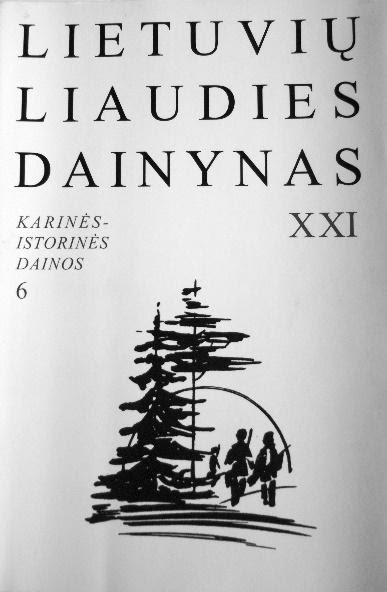A large and continuously updated collection of magnetic sound recordings is housed at the Lithuanian Folklore Archives (magnetic tapes and audiocasettes amounting to around 8,500 hours). The first sound recordings were made on magnetic tape in 1952 when fighters of the national resistance were still hiding in Lithuania’s forests, and were persecuted by the secret service of the Soviet Union. At that time, a new style of song was being sung in Lithuanian villages, created by the resistance fighters themselves as well as their supporters — village poets. These songs told of the fate of the resistance fighters, their battles and deaths. The notebooks in which these songs were recorded were hidden away because any contact with resistance fighters, uncovered clues, or any compromising materials, risked the threat of imprisonment or deportation. The folklore collectors were unable to record these songs as well, because if the Management of the Institute found out, they would be fired. However, in the later Soviet years some of the songs “slipped through” and wound up in the archive (some of the first recordings of these songs were made in 1978). Once the national independence movement started, the resistance songs were sung in public and documenting them became a priority. Thus, an especially large number of these songs were recorded in the 1990s. Drawing on the underground resistance press and the newly gathered material, a volume of resistance fighters’ songs was compiled and published:

Book of Lithuanian Folk Songs, vol. XXI. War-Historical songs, vol. 6 - Resistance songs. Compiled by Kostas Aleksynas, melodies were prepared by Živilė Ramoškaitė. Vilnius: Institute of Lithuanian Literature and Folklore, 2009.
From 2012–2014, together with other academic institutions, the Institute of Lithuanian Literature and Folklore executed the project supported by EU structural funds “Development and Providing Access to IRT Solutions and Content Helping to Preserve the Lithuanian Language in Public Space”. As part of this project, folklorists of the Institute began compiling the digital card catalogue of songs of the post-World War II armed resistance movement , as well as digitizing the magnetic tapes and cassettes on which these songs were recorded. In the Lithuanian Folklore Archives database, a collection of sound recordings of post-war resistance fighters’ songs was created (1,197 items). We invite you to listen to the archival recordings.
| Fondas: | LTRF mg |
| Signature: | LTRF mg 3687 |
|
Song title : | Emilijos Stanikaitės užrašytos tautosakos garso įrašas |
| Dokumentų rūšys: |
1. garso įrašai
|
| Susiję ištekliai: |
1. LTR 5861 (Pastabos: nr. 173., p. 118)
|
| Fondo dokumentai: |
LTRF mg 3687-01 Ko liūdi, putinėli, ko liūdi
LTRF mg 3687-02 Aviža prašė gražiai pasėti
LTRF mg 3687-03 Pasakyk, mergele, darželio rūtele
LTRF mg 3687-04 Tenai už kalnų, už miškų
LTRF mg 3687-05 Va ir vot, va ir vot
LTRF mg 3687-06 Klepu, klepu kaimynėlis
LTRF mg 3687-07 Mergele jaunoji
LTRF mg 3687-08 Nemįslijau, negalvojau
LTRF mg 3687-09 Kada noriu verkiu
LTRF mg 3687-10 Linelį raunu ne viena
LTRF mg 3687-11 Aš prisimenu namelį
LTRF mg 3687-12 Saulė teka, saulė leidžias
LTRF mg 3687-13 Oi čiučiai liuliai
LTRF mg 3687-14 An kalno klevelis stovėjo
LTRF mg 3687-15 Tu, lineli, žydražiedi
LTRF mg 3687-16 Anoj pusėj Nemunėlio
LTRF mg 3687-17 Sėdžiu po langeliu
LTRF mg 3687-18 Ir buvo toks laikas
LTRF mg 3687-19 Nu buvo tokis labai senas vilkas
LTRF mg 3687-20 Nu buvo bobukė-močiutė ir dziedukas
LTRF mg 3687-21 Kaip aš augau pas tėvelį
LTRF mg 3687-22 Skenduolis pasako, kur prigėręs
LTRF mg 3687-23 Sakmė apie pakaruoklius
LTRF mg 3687-24 Kaip Žurinskas apraganotą žmogų išgelbėjo
LTRF mg 3687-25 Raganių namas
LTRF mg 3687-26 Pavogus bažnytinius daiktus vaidenosi
LTRF mg 3687-27 Apie pavogtus bažnytinius daiktus
LTRF mg 3687-28 Numirėlis prašo grąžinti, ką paėmus
LTRF mg 3687-29 Tu, giruže, tu žalioji
LTRF mg 3687-30 Tu balta lelija
LTRF mg 3687-31 Pražydo dobilas raudonas
LTRF mg 3687-32 Vai, ko nusižvengei
LTRF mg 3687-33 Subatos rytelį
LTRF mg 3687-34 Aš pasėjau žalią rūtą
LTRF mg 3687-35 Mergele jaunoji
LTRF mg 3687-36 Piršly piršly
LTRF mg 3687-37 Mergužėle, ko verki
LTRF mg 3687-38 Augo dukralė
LTRF mg 3687-39 Dainuok, sesula, pakol jauna
LTRF mg 3687-40 Auginau dukrelį ne sau, ne sau
LTRF mg 3687-41 Penki brolaliai lankoj šieną pjovė
LTRF mg 3687-42 Aš šio nakt naktelį
LTRF mg 3687-43 Ėj mergaitė pamariais
|
| Anotacija: |
Garso įrašą sudaro 34 dainos, 7 sakmės, 2 pasakos. |
| Bendras turinio vienetų kiekis: |
43 |
| Duomenų klasifikacija (žanrinis skirstymas): |
1. LIAUDIES DAINOS (1-18, 21, 29-43.)
2. PASAKOS (19, 20)
3. SAKMĖS (22-28)
|
| Pateikimo būdas: |
1. vokalinis folkloro pateikimas
2. sakytinis folkloro pateikimas
|
| Užrašymo metai: |
1989 |
| Užrašytojas: |
Emilija Stanikaitė |
| Užrašymo vieta: |
1.
Nieko nerasta (originale: ...Didžiulių km. , pastabos: Punsko valsčiuje, Seinų apskrityje, Palenkės vaivadijoje. )
2.
Nieko nerasta (originale: Vidugirių kaime, Punsko-Seinų kraštas , pastabos: Nuo Punsko kaimas nutolęs 13 km.)
|
|
Ekspedicija: | MA LKLI kompl. eksp. |
| Pateikėjai: |
1. Emilija Sinkevičienė-Zubavičiūtė (apsk.vnt: 1, 2, 32-43)
2. Ona Zubavičienė-Jankeliūnaitė (apsk.vnt: 129, 30, 33-43)
3. Ona Sinkevičiūtė (apsk.vnt: 31, 32)
4. Ona Marteckienė-Vaičiulytė (apsk.vnt: 7-11)
5. Jonas Marteckas (apsk.vnt: 12)
6. Ona Drutienė-Micevičiūtė (apsk.vnt: 13, 19, 21)
7. Teresė Janušonienė-Drutytė (apsk.vnt: 16-18)
8. Natalija Lukoševičienė (apsk.vnt: 16-18)
9. Aldutė Janušonytė (apsk.vnt: 14, 15, 20, 16)
10. Alfonsas Šimčikas (apsk.vnt: 22-28)
11. Mikasė Šimčikienė-Nevulytė (apsk.vnt: 29, 30)
12. Juozas Sinkevičius (apsk.vnt: 31, 32)
13. Rūta Sinkevičiūtė (apsk.vnt: 31, 32)
14. Ona Sinkevičiūtė (apsk.vnt: 31, 32)
15. Danguolė Sinkevičiūtė (apsk.vnt: 31, 32)
16. Alytė Janušonytė (apsk.vnt: 14, 15)
17. Jolytė Janušonytė (apsk.vnt: 14, 15)
|






